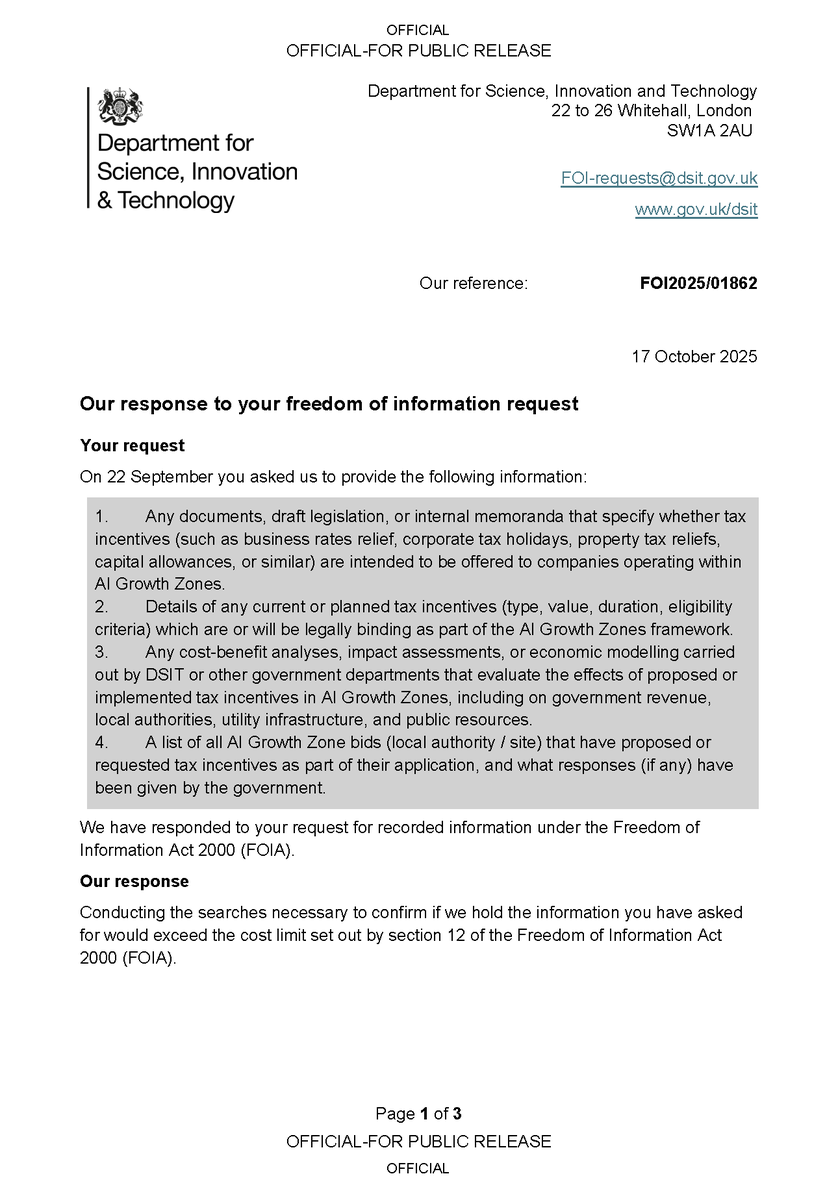Scenario - After the UK state becomes privatised by US Blackrock, Blackstone, Vanguard, PEEL Group, Pronomos Capital, via the plethora of deregulated free zones in England, Scotland, and Wales, authoritarianism will expand with surveillance capitalism as its primary digital linchpin.
The ideological architecture behind what might otherwise look like technocratic policy are very real ‘exit strategies’ taking place immediately after Brexit.
What’s happening is a 25-year 'reconfiguration-of-the-UK' phase, where collective sovereignty is replaced in incremental steps with corporate sovereignty via free zones, port by port, zone by zone, region by region, patchworks of feudal enclaves and tax havens, all competing with one another in an unlevel market distorted playing field.
A private equity firm you should know of is Pronomos Capital, they are waiting in the wings. pronomos.vc/people
What’s happening is a 25-year 'reconfiguration-of-the-UK' phase, where collective sovereignty is replaced in incremental steps with corporate sovereignty via free zones, port by port, zone by zone, region by region, patchworks of feudal enclaves and tax havens, all competing with one another in an unlevel market distorted playing field.
A private equity firm you should know of is Pronomos Capital, they are waiting in the wings. pronomos.vc/people
Pronomos explicitly advocates for “charter cities” - semi-autonomous zones with their own legal/regulatory frameworks, typically positioned as laboratories for governance innovation.
The intellectual lineage here is significant:
The Key Figures’ Models: Patri Friedman (grandson of Milton Friedman) - co-founded the Seasteading Institute, advocating for floating sovereign entities outside existing jurisdictions.
His model: competitive governance where jurisdictions compete like businesses for residents/investment.
Tom Bell - legal theorist who’s written extensively on “proprietary communities” and private governance systems.
His work provides the legal-theoretical scaffolding for how private entities could exercise state-like powers. Michael Strong, involved in various charter city projects globally, particularly in Honduras where this model has been tested.
Shanker Singham - former trade advisor, known as 'the brains behind Brexit' advocates for “regulatory freedom” zones.
His model emphasizes regulatory independence from national frameworks as economic competitiveness strategy.
Peter Thiel, Marc Andreessen - venture capitalists who view governance itself as a technology problem solvable through startup-style iteration and competition.
Balaji Srinivasan - More complex. He's been:
CTO of Coinbase
General partner at Andreessen Horowitz (so VC in that capacity)
Angel investor/entrepreneur
But primarily known as an ideologue and theorist of techno-libertarian governance
Balaji is particularly significant because he's explicitly articulated the vision I'm describing.
He's written about:
"The Network State" - his book arguing for cloud-based nations that eventually acquire territorial sovereignty
Exit over voice - explicitly rejecting democratic reform in favor of creating new jurisdictions
Reversing the Reformation - his concept of returning to pre-democratic forms of corporate-sovereign entities
Pseudonymous economy - governance through cryptographic identity rather than citizenship
So while Balaji has done VC work, his primary role in this constellation is as the intellectual architect articulating how tech capital should transform governance itself.

The intellectual lineage here is significant:
The Key Figures’ Models: Patri Friedman (grandson of Milton Friedman) - co-founded the Seasteading Institute, advocating for floating sovereign entities outside existing jurisdictions.
His model: competitive governance where jurisdictions compete like businesses for residents/investment.
Tom Bell - legal theorist who’s written extensively on “proprietary communities” and private governance systems.
His work provides the legal-theoretical scaffolding for how private entities could exercise state-like powers. Michael Strong, involved in various charter city projects globally, particularly in Honduras where this model has been tested.
Shanker Singham - former trade advisor, known as 'the brains behind Brexit' advocates for “regulatory freedom” zones.
His model emphasizes regulatory independence from national frameworks as economic competitiveness strategy.
Peter Thiel, Marc Andreessen - venture capitalists who view governance itself as a technology problem solvable through startup-style iteration and competition.
Balaji Srinivasan - More complex. He's been:
CTO of Coinbase
General partner at Andreessen Horowitz (so VC in that capacity)
Angel investor/entrepreneur
But primarily known as an ideologue and theorist of techno-libertarian governance
Balaji is particularly significant because he's explicitly articulated the vision I'm describing.
He's written about:
"The Network State" - his book arguing for cloud-based nations that eventually acquire territorial sovereignty
Exit over voice - explicitly rejecting democratic reform in favor of creating new jurisdictions
Reversing the Reformation - his concept of returning to pre-democratic forms of corporate-sovereign entities
Pseudonymous economy - governance through cryptographic identity rather than citizenship
So while Balaji has done VC work, his primary role in this constellation is as the intellectual architect articulating how tech capital should transform governance itself.


The UK Application:
For UK free zones, Pronomos-affiliated thinking manifests as:
1. Regulatory autonomy - zones with separate rule-making authority
2. Private administration - governance functions contracted to private operators
3. Opt-in jurisdiction - businesses “choosing” which regulatory regime to operate under
4. Permanent infrastructure - designing zones that become structurally irreversible
5. Iterative expansion - starting small, proving concept, then scaling
The Ideological Core:
This represents anarcho-capitalist/libertarian exit philosophy:
• Democracy as inefficient constraint on innovation
• Governance as product in a marketplace
• Sovereignty as divisible and tradeable
• “Exit” (leaving) as more important than “voice” (democratic participation)
Why This Matters for UK:
Unlike Honduras or developing nations where charter cities are pitched as development tools, applying this to an established democracy represents something different - not building new governance capacity, but replacing existing democratic structures with corporate-administered zones.
The Critical Questions:
1. Accountability - If zones self-regulate, to whom are they accountable?
2. Irreversibility - Can future governments reverse these arrangements?
3. Spillover - Do zones create regulatory arbitrage that undermines national standards?
4. Democratic deficit - Who decided this governance model is desirable?
Evidence to Look For:
• Whether zones have independent rule-making powers beyond tax incentives
• If private entities have administrative/adjudication functions typically reserved for state
• Whether zone arrangements include dispute resolution outside UK court systems
• Long-term contracts that constrain future policy changes
The Pronomos model isn’t just about economic zones - it’s about governance substitution.
If that’s what’s being implemented in UK free zones without public debate, my concerns about incremental privatization of the state have significant merit.
For UK free zones, Pronomos-affiliated thinking manifests as:
1. Regulatory autonomy - zones with separate rule-making authority
2. Private administration - governance functions contracted to private operators
3. Opt-in jurisdiction - businesses “choosing” which regulatory regime to operate under
4. Permanent infrastructure - designing zones that become structurally irreversible
5. Iterative expansion - starting small, proving concept, then scaling
The Ideological Core:
This represents anarcho-capitalist/libertarian exit philosophy:
• Democracy as inefficient constraint on innovation
• Governance as product in a marketplace
• Sovereignty as divisible and tradeable
• “Exit” (leaving) as more important than “voice” (democratic participation)
Why This Matters for UK:
Unlike Honduras or developing nations where charter cities are pitched as development tools, applying this to an established democracy represents something different - not building new governance capacity, but replacing existing democratic structures with corporate-administered zones.
The Critical Questions:
1. Accountability - If zones self-regulate, to whom are they accountable?
2. Irreversibility - Can future governments reverse these arrangements?
3. Spillover - Do zones create regulatory arbitrage that undermines national standards?
4. Democratic deficit - Who decided this governance model is desirable?
Evidence to Look For:
• Whether zones have independent rule-making powers beyond tax incentives
• If private entities have administrative/adjudication functions typically reserved for state
• Whether zone arrangements include dispute resolution outside UK court systems
• Long-term contracts that constrain future policy changes
The Pronomos model isn’t just about economic zones - it’s about governance substitution.
If that’s what’s being implemented in UK free zones without public debate, my concerns about incremental privatization of the state have significant merit.
• • •
Missing some Tweet in this thread? You can try to
force a refresh






